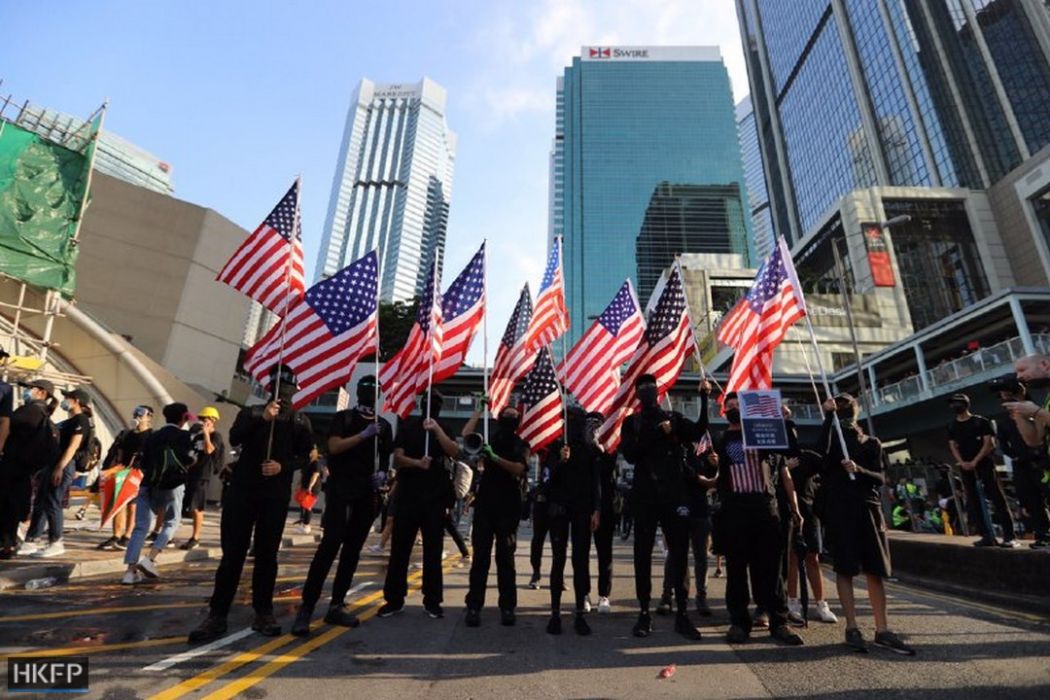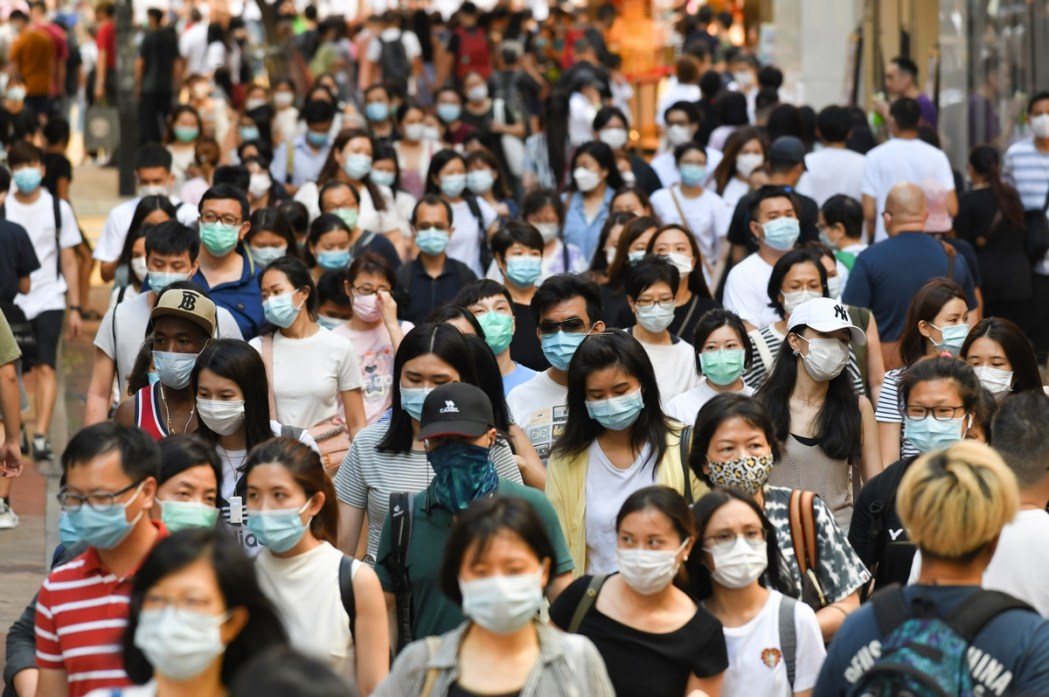By Gerald C. Brown and Sasha Ramani
In recent years, the Chinese Communist Party has become increasingly aggressive in the region, culminating in the imposition of its draconian National Security Law on Hong Kong. The US government’s swift response has resulted in many Hongkongers supporting President Trump’s reelection, thanks to his administration’s “tough on China” policies.
But with the ascendance of President-elect Biden after a fiercely contested election, there are questions about how US policy in Asia and support for Hong Kong may shift. Many Hongkongers are uncertain about what the future may hold.

But democratic activists should take comfort in a Biden presidency. Not only is support for Hong Kong deeply bipartisan, but the President-elect has made it clear that it will remain tough on China while prioritising regional alliances and partnerships to counter the Chinese government’s aggression and overreach. American support for Hong Kong is here to stay.
How Hong Kong won American support
While the Trump administration has undoubtedly been supportive of Hong Kong, the president’s record on the subject is mixed. During the 2014 Umbrella Movement, he wrote that then-President Obama should “stay out of the Hong Kong protests” – a philosophy which he continued to hold during his own presidency.
Trump began his presidency by flattering dictators like China’s Xi Jinping, whom he called the “greatest leader in Chinese history” and praised for making himself “president for life.” Instead of viewing regional democracies as partners based on shared values, he saw them as pawns to achieve his goals. The relationships were transactional to Trump, who contemplated cutting support for Taiwan as a bargaining chip in trade talks with China.
Trump even considered vetoing the Hong Kong Human Rights and Democracy Act, stating that the US had to stand by Xi Jinping as well as Hong Kong.

Not to be deterred, the Hong Kong people brilliantly earned global media attention by crowdfunding ads and through international grassroots mobilisation. The global diaspora staged sympathy protests around the world. And when Hongkongers marched with US flags and sang the US national anthem, Americans felt proud that for all their nation’s faults, it remained the global symbol of freedom and democracy.
Despite Trump’s ambivalence, Hong Kongers won the support of the American people and of Congress, which collectively forced the Trump administration to change its tune. A reluctant Trump was forced to sign the Hong Kong Human Rights and Democracy Act into law.
The Covid effect
Covid-19 changed how President Trump viewed China. He initially praised Chinese efforts to contain the virus, even writing that Xi Jinping was “strong, sharp, and powerfully focused on leading the counterattack on the coronavirus.” But when the virus began killing thousands of Americans and Chinese Foreign Minister spokesman Zhao Lijian blamed its origin on American soldiers, Trump’s political calculations favoured a tougher China policy. He quickly pivoted to blaming China for the virus, and the “tough on China” strategy was born.
Once the administration’s hawks found their wings, Secretary of State Mike Pompeo quickly began recruiting other nations to the cause. Fortunately, there were many eager to join the new strategy, thanks to several own-goals by Chinese diplomats and its “wolf warriors,” who decided to simultaneously threaten Canada, Australia, India, the Czech Republic, the United Kingdom and Taiwan, amongst others.

These and countless other diplomatic faux pas, along with ham-fisted propaganda that accompanied the coronavirus, contributed to record-high unfavourable views of China around the world and bolstered commitment to the “Quad” alliance and closer military ties with the US.
With Congress and the President aligned, supportive legislation could pass unimpeded. In July, as soon as the National Security Law was imposed on Hong Kong, the Hong Kong Autonomy Act became law at breakneck speed. It took less than two weeks from introduction to enactment, compared with five months for the Hong Kong Human Rights and Democracy Act.
Bipartisan support
While Republicans have certainly been the most vocal, US support for Hong Kong, Uyghurs, Taiwan, and countering Chinese aggression and coercion around the world has been unequivocally bipartisan: a feat which is extremely rare in American politics.
Scott Kennedy of CSIS recently revealed that legislators from both parties sponsor supportive legislation in nearly equal amounts. While Republican Senator Marco Rubio introduced the Hong Kong Human Rights and Democracy Act, Vice President-elect Kamala Harris co-sponsored it along with the majority of their Senate colleagues. The Democrats’ leading voice in Congress, House Speaker Nancy Pelosi, was a tireless advocate for its passage and met activists such as Joshua Wong and Nathan Law at the US Capitol.

Pelosi has been a thorn in Beijing’s side for decades. After the 1989 Tiananmen Square massacre, she fought to protect the 40,000 Chinese students in the US at the time from the “butchers of Beijing.” And on a trip to Beijing in 1991, she unfurled a banner in Tiananmen Square that read “to those who died for democracy in China.” Similarly, Republican Senators Rick Scott and Ted Cruz flew to Hong Kong in 2019 to join the protests and meet activists.
What to expect from a Biden presidency
The consensus is that American policy towards China will not change significantly under President-elect Biden. This isn’t to say Biden’s past is beyond reproach on the issue, but the dynamic has changed significantly in recent years, and the US stance on China has changed accordingly.
Indeed, Biden’s views have evolved significantly since he was Vice President. It’s not just Trump who has woken up to the threat China poses to America’s friends in the Pacific: it’s the American people and US Government as a whole.
In a recent op-ed on American leadership, Biden acknowledged that the US needs “to get tough with China.” He has repeatedly called Xi Jinping a “thug” and slammed his actions in Hong Kong and Xinjiang. The Biden campaign has declared China’s treatment of Uyghurs “genocide” and its website says that “Joe will speak out against the internment camps in Xinjiang and hold the people and companies complicit in this appalling oppression accountable.”

Biden congratulated Taiwanese President Tsai Ing-wen on both her re-election and second inauguration, and wrote that he would work to deepen relations with Taiwan.
The Wall Street Journal wrote that “the US has turned a corner in its relations with China and is likely to maintain a harder line.” The Washington Post reported that Chinese experts believe that a Biden administration would be more dangerous for China because “[Biden] will work with allies to target China,” and [Biden] might resort to more sophisticated and coordinated tactics against China. Axios agrees, claiming that Biden will “confront China across the globe” with the support of US allies.
Kurt Campbell, the top Asia official in President Obama’s State Department, believes that “there is a broad recognition in the Democratic Party that Trump was largely accurate in diagnosing China’s predatory practices,” but that a Biden administration would respond more effectively. In this sense, Biden and Trump differ only in their tactics, not their outlook. There will not be a sharp change of course under Biden’s administration.
Looking ahead
The United States is an extremely divided country, with few issues that unite both Democrats and Republicans. But Americans and their political leaders are united in their concern about an increasingly aggressive and authoritarian China. The Biden administration will continue pushing back against Beijing and standing up for Hongkongers, Uyghurs and Taiwan.
While the Trump administration must be given credit for helping to raise the issue, support for our friends in Asia is not coming to an end, and Biden’s consistent foreign policy and strong focus on supporting allies and partners is likely to be a more effective approach.

The fight against the Chinese Communist Party and its inhumane tactics is likely to span decades and many presidential terms. For American support to last, it’s critical that the cause be acknowledged as bipartisan and that unity is able to grow and flourish.
Hong Kong protesters talk about not “cutting the mat” – an expression that calls for unity amidst political or ideological divisions. The same rationale applies to US politics. Bipartisan support for democracy in Asia continues to grow. Activists should encourage cooperation amidst the strong bipartisan base on these issues.
Gerald C. Brown is an analyst with Valiant Integrated Services, where he supports the US Department of Defense, focusing on nuclear deterrence and East Asian security. All views expressed here are his own. Sasha Ramani is a fintech professional and strategy consultant. He holds a Masters in Public Policy from Harvard University and works with Hong Kong activists around the world. All views expressed here are his own.
Support HKFP | Policies & Ethics | Error/typo? | Contact Us | Newsletter | Transparency & Annual Report | Apps
| HKFP is an impartial platform & does not necessarily share the views of opinion writers or advertisers. HKFP presents a diversity of views & regularly invites figures across the political spectrum to write for us. Press freedom is guaranteed under the Basic Law, security law, Bill of Rights and Chinese constitution. Opinion pieces aim to point out errors or defects in the government, law or policies, or aim to suggest ideas or alterations via legal means without an intention of hatred, discontent or hostility against the authorities or other communities. |
Help safeguard press freedom & keep HKFP free for all readers by supporting our team

More HKFP OPINION:
HKFP has an impartial stance, transparent funding, and balanced coverage guided by an Ethics Code and Corrections Policy.
Support press freedom & help us surpass 1,000 monthly Patrons: 100% independent, governed by an ethics code & not-for-profit.










